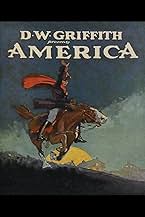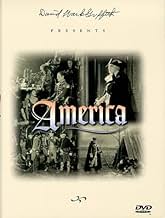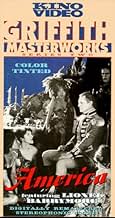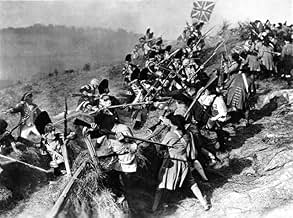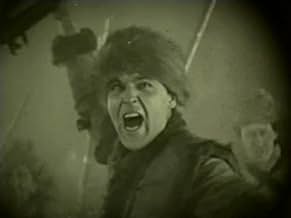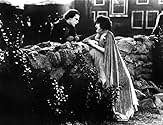Ajouter une intrigue dans votre langueThe story of a family caught up in the American Revolutionary War.The story of a family caught up in the American Revolutionary War.The story of a family caught up in the American Revolutionary War.
- Réalisation
- Scénario
- Casting principal
- Récompenses
- 1 victoire au total
Lucille La Verne
- A Refugee Mother
- (as Lucile La Verne)
Paul Doucet
- Marquis de Lafayette
- (as H. Paul Doucet)
Avis à la une
"America" (United Artists, 1924), subtitled "Love and Sacrifice," became director D.W. Griffith's second contribution to American history on the silent screen. Done in grand scale as his Civil War epic, "The Birth of a Nation" (Epoch, 1915), "America," as indicated in it's opening title, "The story of the sacrifice made for freedom in the American Revolution in that of a Civil War between two groups of English people, one group, the Americans, being merely Englishmen while settling on the American continent ..." What "Birth of a Nation" and "America" have in common are its well staged battle scenes, cast of thousands, authentic costumes, fine scenery, and stories told in two parts (before and aftermath) with run times past the standard two hour mark. What "America" lacks is the controversy "Birth of a Nation" contains during its final hour. In retrospect, "America" didn't need controversy to achieve any box office appeal, only a simple love story highlighted by a re-enactment of events leading to America's freedom from British rule.
Set in the village of Lexington in Massachusetts prior to the Revolutionary War, Nathan Holden (Neil Hamilton), a poor farmer and express rider, loves Nancy Montague (Carol Dempster), a Southern bells from Virginia living on the mountain estate on the James River. Her stern father (Erville Alderson) and dandy brother, Philip Edward (Charles Emmett Mack) each disapprove of her relationship with a commoner. Captain Walter Butler (Lionel Barrymore), a deputy for the king's superintendent, takes an interest in Nancy, much to the delight of her father, especially after believing Nathan to have shot and wounded him during their confrontation. Butler proves not to be her ideal choice for Nancy as he gets the Indians to side with the king against the Americans in the war along with plotting to betray the king in order to acquire the new world for himself.
Combining fictional characters with historical figures, quite commonly found in many motion pictures then and now, "America" consists those of John Hancock (played by John Dunton); Thomas Jefferson (Frank Wals); Patrick Henry (Frank McGlynn); John Parker, Captain of the Minute Men (Henry Van Boussen); and Samuel Adams (Lee Beggs). Benjamin Franklin, who was part of that era, is noticeably missing. One person not to miss is veteran character actress Lucille LaVerne appearing briefly as a refugee mother.
While "America" fails to compare with Griffith's finest works, the film itself is noteworthy as being one of the very few motion pictures depicting the Revolutionary War (1775-1783) compared to many about the Civil War (1861-1865). Highlights include Paul Revere's (Harry O'Neil) historic horseback ride warning the colonists, "To Arms, To Arms, the Regulars /British are coming"; the Battle of Bunker Hill; the signing of the Declaration of Independence; and George Washington (Arthur Dewey) leading and his troops at Valley Forge and he being sworn in as first president of the United States (1789-1797).
Had "America" been produced in the wake of "The Birth of a Nation," chances are principal actors would have been basically the same, with Lillian Gish or Mae Marsh, Robert Harron and Henry B. Walthall in the roles enacted by Dempster, Hamilton and Barrymore. Would the results have been better or not is uncertain. Hamilton and Dempster as its leading players fail to leave a lasting impression as the star quality performances of Lillian Gish or Richard Barthelmess. In fact, their roles are overshadowed by the major support of Lionel Barrymore as the villainous redcoat, and the late entrance of Louis Wolheim as "Captain Hare, a Tory - an American renegade who uses the excuse of war for his own personal passions of savagery."
With silent films commonly shown on public television during the 1960s and 70s, in such weekly series as "The Toy That Grew Up" or "The Silent Years," "America" made its rare TV broadcast in the New York City area on WNET, Channel 13, appropriately during 4th of July weekend in 1972. The print shown was the commonly circulated abridged 93 minute version from the Killiam Film Collection with music score and narration, the same print used on Republic Home Video in the 1990s. While this may have been the start of an annual Independence Day tradition, especially for the upcoming Bicentennial year (1976), after several broadcasts, (Premiere: July 1, with two shows a day July 2 through 4), "America" was never shown again. It wasn't until 1996 when a fully restored 140 minute/ color tinted version turned up on VHS and later DVD from Kino Video accompanied by newly composed score by the Mammaroneck Theater Orchestra.
Overlooking cliché plot and lackluster performances by Hamilton and Dempster, "America" is redeemed by its fine visuals, authentic background, and Griffith's attention to detail, including soldiers marching in bitter cold with shoes so worn out that their feet are seen touching the snow. "America" should have been among Griffith's greatest work, but it isn't. Granted, portions of the story are dull, others are not. In spite of its fine restoration, one of its main drawbacks is its occasional dull orchestration (except for the action scenes) that accompanies it. With all that said, "America" is something to consider, if not for American history, then for history by the American father of film himself, D.W. Griffith. Let Freedom Ring. (***)
Set in the village of Lexington in Massachusetts prior to the Revolutionary War, Nathan Holden (Neil Hamilton), a poor farmer and express rider, loves Nancy Montague (Carol Dempster), a Southern bells from Virginia living on the mountain estate on the James River. Her stern father (Erville Alderson) and dandy brother, Philip Edward (Charles Emmett Mack) each disapprove of her relationship with a commoner. Captain Walter Butler (Lionel Barrymore), a deputy for the king's superintendent, takes an interest in Nancy, much to the delight of her father, especially after believing Nathan to have shot and wounded him during their confrontation. Butler proves not to be her ideal choice for Nancy as he gets the Indians to side with the king against the Americans in the war along with plotting to betray the king in order to acquire the new world for himself.
Combining fictional characters with historical figures, quite commonly found in many motion pictures then and now, "America" consists those of John Hancock (played by John Dunton); Thomas Jefferson (Frank Wals); Patrick Henry (Frank McGlynn); John Parker, Captain of the Minute Men (Henry Van Boussen); and Samuel Adams (Lee Beggs). Benjamin Franklin, who was part of that era, is noticeably missing. One person not to miss is veteran character actress Lucille LaVerne appearing briefly as a refugee mother.
While "America" fails to compare with Griffith's finest works, the film itself is noteworthy as being one of the very few motion pictures depicting the Revolutionary War (1775-1783) compared to many about the Civil War (1861-1865). Highlights include Paul Revere's (Harry O'Neil) historic horseback ride warning the colonists, "To Arms, To Arms, the Regulars /British are coming"; the Battle of Bunker Hill; the signing of the Declaration of Independence; and George Washington (Arthur Dewey) leading and his troops at Valley Forge and he being sworn in as first president of the United States (1789-1797).
Had "America" been produced in the wake of "The Birth of a Nation," chances are principal actors would have been basically the same, with Lillian Gish or Mae Marsh, Robert Harron and Henry B. Walthall in the roles enacted by Dempster, Hamilton and Barrymore. Would the results have been better or not is uncertain. Hamilton and Dempster as its leading players fail to leave a lasting impression as the star quality performances of Lillian Gish or Richard Barthelmess. In fact, their roles are overshadowed by the major support of Lionel Barrymore as the villainous redcoat, and the late entrance of Louis Wolheim as "Captain Hare, a Tory - an American renegade who uses the excuse of war for his own personal passions of savagery."
With silent films commonly shown on public television during the 1960s and 70s, in such weekly series as "The Toy That Grew Up" or "The Silent Years," "America" made its rare TV broadcast in the New York City area on WNET, Channel 13, appropriately during 4th of July weekend in 1972. The print shown was the commonly circulated abridged 93 minute version from the Killiam Film Collection with music score and narration, the same print used on Republic Home Video in the 1990s. While this may have been the start of an annual Independence Day tradition, especially for the upcoming Bicentennial year (1976), after several broadcasts, (Premiere: July 1, with two shows a day July 2 through 4), "America" was never shown again. It wasn't until 1996 when a fully restored 140 minute/ color tinted version turned up on VHS and later DVD from Kino Video accompanied by newly composed score by the Mammaroneck Theater Orchestra.
Overlooking cliché plot and lackluster performances by Hamilton and Dempster, "America" is redeemed by its fine visuals, authentic background, and Griffith's attention to detail, including soldiers marching in bitter cold with shoes so worn out that their feet are seen touching the snow. "America" should have been among Griffith's greatest work, but it isn't. Granted, portions of the story are dull, others are not. In spite of its fine restoration, one of its main drawbacks is its occasional dull orchestration (except for the action scenes) that accompanies it. With all that said, "America" is something to consider, if not for American history, then for history by the American father of film himself, D.W. Griffith. Let Freedom Ring. (***)
I really wanted to like this film and I don't think I was terribly disappointed. Being an American History teacher, I felt an obligation, almost, to see this film and as far as the history went, it wasn't bad. Sure there were a few mistakes here and there (especially with the timeline--the movie only appeared to last a few months or perhaps a year--not over six years of actual fighting), but the overall spirit of the film and the battle sequences were excellent. Unfortunately, the movie ALSO included a pretty meaningless subplot involving a difficult to believe romance between a poor patriot and a rich Loyalist. For the most part, it really served to distract from the overall plot and just seemed "tacked on"--like a plot device instead of a real honest-to-goodness romance. In fact, as much of the romance boiled down to the dumb cliché of "love at fist sight", it was kind of annoying the more I think about it.
However, in spite of this romance, the film is truly interesting and inspiring---plus, in so many ways it seems as if the much later film, THE PATRIOT, was copied from this Griffith film!!! Both films followed the exploits of an evil leader fighting for the British and using horrible and evil tactics against the civilians--and both having the secret intention of using this as a "springboard" to starting their OWN nation in the America!!! The only major difference is that this film is set in the North and THE PATRIOT was in the Carolinas. It sure would have been nice if Mel Gibson and the rest had acknowledged their debt to D. W. Griffith for the story ideas. It just doesn't seem all that likely that the two stories were created independently of each other.
PS--Despite me liking this film and some other of Griffith's films, he DOES deserve to once again "burn in hell" for his having White actors portray all the Black servants in the film! This is a sick and bigoted thing that Griffith did in so many of his films--especially in BIRTH OF A NATION. I gotta assume based on this and the way he portrays Blacks that he was A-OK with slavery and was quite the apologist for this "quaint institution" (don't get mad at me--this IS meant as sarcasm).
However, in spite of this romance, the film is truly interesting and inspiring---plus, in so many ways it seems as if the much later film, THE PATRIOT, was copied from this Griffith film!!! Both films followed the exploits of an evil leader fighting for the British and using horrible and evil tactics against the civilians--and both having the secret intention of using this as a "springboard" to starting their OWN nation in the America!!! The only major difference is that this film is set in the North and THE PATRIOT was in the Carolinas. It sure would have been nice if Mel Gibson and the rest had acknowledged their debt to D. W. Griffith for the story ideas. It just doesn't seem all that likely that the two stories were created independently of each other.
PS--Despite me liking this film and some other of Griffith's films, he DOES deserve to once again "burn in hell" for his having White actors portray all the Black servants in the film! This is a sick and bigoted thing that Griffith did in so many of his films--especially in BIRTH OF A NATION. I gotta assume based on this and the way he portrays Blacks that he was A-OK with slavery and was quite the apologist for this "quaint institution" (don't get mad at me--this IS meant as sarcasm).
America (1924)
*** (out of 4)
This film is basically a remake of The Birth of a Nation but this time the story is set during the American Revolutionary War. We have George Washington (Arthur Dewey) trying to make our country free while Capt. Walter Butler (Lionel Barrymore) tries to get the Indians on his side to attack what one hopes to become the new America. In the mean time, two young lovers (Neil Hamilton, Carol Dempster) are split apart due to them fighting on opposite sides of the war. This film was a notorious flop when originally released and everything Griffith made after this was basically done so that he could clean up debts gathered by this film. Time has certainly been kinder to the film than movie crowds in 1924 because this is a pretty strong take on the war that features a nice story, great battle scenes and some fine performances. Barrymore steals the show with his crazed performance but he never goes over the top but even without words you can see the passion on his face as he fights for what he believes is right. Hamilton and Dempster are both fine in their roles, although I'm sure stronger actors would have been better. The majority of the film deals with the actual story of the war and not the battle scenes. Griffith handles all the quiet moments very well but there's no question that the battle scenes are where the energy is at. Hundreds of extras were used and again, like previous Griffith epics, the battle scenes look incredibly realistic as if Griffith were there filming while the real battles were taking place. The story of the families being split apart probably would have worked better had it not been so familiar as to the story in The Birth of a Nation but either way this was Griffith's last epic and while it's not the masterpiece of The Birth of a Nation or Intolerance, it's still impressive film-making.
*** (out of 4)
This film is basically a remake of The Birth of a Nation but this time the story is set during the American Revolutionary War. We have George Washington (Arthur Dewey) trying to make our country free while Capt. Walter Butler (Lionel Barrymore) tries to get the Indians on his side to attack what one hopes to become the new America. In the mean time, two young lovers (Neil Hamilton, Carol Dempster) are split apart due to them fighting on opposite sides of the war. This film was a notorious flop when originally released and everything Griffith made after this was basically done so that he could clean up debts gathered by this film. Time has certainly been kinder to the film than movie crowds in 1924 because this is a pretty strong take on the war that features a nice story, great battle scenes and some fine performances. Barrymore steals the show with his crazed performance but he never goes over the top but even without words you can see the passion on his face as he fights for what he believes is right. Hamilton and Dempster are both fine in their roles, although I'm sure stronger actors would have been better. The majority of the film deals with the actual story of the war and not the battle scenes. Griffith handles all the quiet moments very well but there's no question that the battle scenes are where the energy is at. Hundreds of extras were used and again, like previous Griffith epics, the battle scenes look incredibly realistic as if Griffith were there filming while the real battles were taking place. The story of the families being split apart probably would have worked better had it not been so familiar as to the story in The Birth of a Nation but either way this was Griffith's last epic and while it's not the masterpiece of The Birth of a Nation or Intolerance, it's still impressive film-making.
Slow but beautifully-mounted story of the American revolution. Griffith's story-telling seems a lot less heavy-handed than in his earlier historical epics and his tableaux work is fully integrated into the action. Lionel Barrymore is an utter swine, Neil Hamilton is poor but dashing and Carol Dempster is.... well, Carol Dempster is most of what is wrong with Griffith in this period, but she doesn't show up often enough to slow the pace and drama.
Note that the trivia for this movie says it came in originally at slightly more than 2 hours when first released, but that no cut exists that runs longer than 90 minutes. However, the dvd release has been presented at a slower fps rate that increases the tension and brings it back to a bit over two hours.
Far better in terms of story-telling than sound versions, such as THE PATRIOT. While not quite in the league of Griffith's best, such as WAY DOWN EAST and BROKEN BLOSSOMS, an excellent way to spend a couple of hours.
Note that the trivia for this movie says it came in originally at slightly more than 2 hours when first released, but that no cut exists that runs longer than 90 minutes. However, the dvd release has been presented at a slower fps rate that increases the tension and brings it back to a bit over two hours.
Far better in terms of story-telling than sound versions, such as THE PATRIOT. While not quite in the league of Griffith's best, such as WAY DOWN EAST and BROKEN BLOSSOMS, an excellent way to spend a couple of hours.
I sincerely believe you need to be American and/or extremely familiar with American revolutionary history and mythology to benefit at all from this movie. Being a European I desperately hung on to Griffith's very long, ponderous inter titles the contents and pedantic tone of which were driving me up the wall with boredom. This is an old-school history lesson with nice, well-lit pictures and it doesn't help a lot that Griffith tries to spice it up with a Romeo & Juliet inspired love affair between Neil Hamilton and Carol Dempster, stilted and artificial.
It never ceases to amaze me how the director who staged the riveting finale of 'Way Down East', the whole continuous glory of 'Hearts of the World', 'Orphans of the Storm', 'Broken Blossoms' and, oh yes, the inimitable, symphonic dynamics of the insurmountable 'Intolerance', how can it be that Griffith as late as 1924 is so uncertain as to what will play and what not?
He was fifty, so? He was going out of fashion fast, here you see why. What happened? Will somebody write the book and let me know?
6/10
It never ceases to amaze me how the director who staged the riveting finale of 'Way Down East', the whole continuous glory of 'Hearts of the World', 'Orphans of the Storm', 'Broken Blossoms' and, oh yes, the inimitable, symphonic dynamics of the insurmountable 'Intolerance', how can it be that Griffith as late as 1924 is so uncertain as to what will play and what not?
He was fifty, so? He was going out of fashion fast, here you see why. What happened? Will somebody write the book and let me know?
6/10
Le saviez-vous
- AnecdotesThis film is regarded as a major turning point in the career of D.W. Griffith. Its critical and public failure ended Griffith's tenure as the industry's preeminent director.
- GaffesPaul Revere falls off his horse. For some reason, Griffith has Revere ride up the steps of people's homes to announce "The British are coming!" as if he has to shout this at their doors. Backing down one set of stairs, Revere's horse falls, tossing the actor, who quickly recovers and shows considerable concern for the horse's welfare. Griffith left in the spill.
- Citations
Nathan Holden: Love may come and love may go, and sigh like the wind from tree to tree. But I shall love no more, no more, till this fair maid come back to me.
- ConnexionsEdited into The Negro Soldier (1944)
Meilleurs choix
Connectez-vous pour évaluer et suivre la liste de favoris afin de recevoir des recommandations personnalisées
Détails
- Durée2 heures 21 minutes
- Mixage
- Rapport de forme
- 1.33 : 1
Contribuer à cette page
Suggérer une modification ou ajouter du contenu manquant

